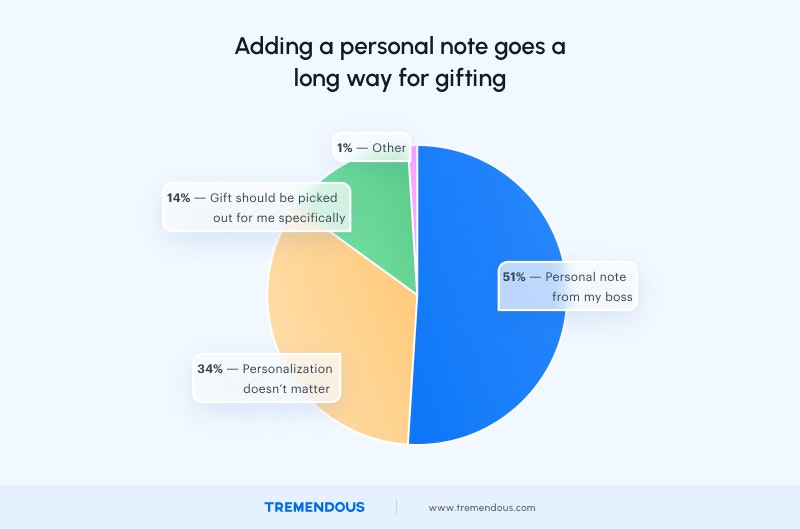How to give the ideal employee gift this holiday season
By Kate Monica●5 min. read●Nov 5, 2025

Giving employees the right holiday gift isn’t difficult – for most people, it’s money.
Key Points
Somewhere between $50-$100 will satisfy most (67%) employees.
People in operations or production, IT, finance, and senior management roles tend to have higher expectations for holiday gifts.
Higher-income employees prefer a gift from their boss, while lower-income employees prefer a gift from the company.
The right gift boosts job satisfaction for three months or more for around 75% of employees.
Don’t be Chevy Chase’s boss in National Lampoon’s Christmas Vacation. He decided to forgo bonuses in favor of Jelly of the Month Club subscriptions, and Clark Griswold was a bit upset about it.
According to our survey, assorted jellies, gift cards for turkey, and gift cards for small denominations do, indeed, disappoint the vast majority of employees. So, what makes them happy?
Money. Specifically, $50-$100 as an employee gift around the holidays will satisfy 65% of the American workforce.
And it’ll pay off big for HR professionals and business leaders: about three-fourths of employees reported they experience an increase in job satisfaction for three months or more after receiving the right holiday gift.
But there’s more to the story. Certain demographics have slightly different preferences, and those making more money tend to have more expensive tastes.
Some people, particularly in IT, expect some level of personalization to their gift, and many have strong opinions about who the gift should come from.
In this guide, we’ll tell you exactly what to get employees, accounting for statistically significant variations across certain roles and salary tiers.
Fortunately, if you’ve got the right data, it’s a lot harder to screw up holiday gifts. And we’ve got the data.
Step-by-step guide to employee holiday gifting
These are the details HR professionals and business leaders will need to work out to ace holiday gifting for employees.
Who should get holiday gifts?
If it’s just a few people, you can type their names and emails into most gifting interfaces. If it’s a bigger team, use a CSV file to import names, amounts, and a custom message, if you want to include one.
When should I send out holiday gifts to employees?
If you’re unsure of when to give the gift, perhaps err on the side of earlier in the holiday season. This is particularly important if you’re in retail or another business that ramps up around Christmas. Remember that a majority of employees feel more satisfied with their jobs for weeks or months after the gift. So, why not have that glow begin during the times you’re asking them to work harder, rather than the aftermath?
How much should an employee holiday gift be?
For most employees, a $50-$100 gift feels right. Think very hard before sending less than that, because cheap gifts often backfire. If you’re recognizing higher-paid employees, that might not be enough. Also think about whether it makes sense for your workplace to give everyone the same gift, or to use a formula or other criteria for who gets how much.
Who should the gift be from?
Employees seem split on whether it should be sent from the company leadership or their direct manager. You can make that call. But definitely don’t note HR as the sender, that clearly falls flat.
How should I send employee holiday gifts?
At most places of employment, emailed gifts are probably the simplest.
Should I personalize employee holiday gifts?
We know what you’re thinking: there’s a reason they call it “cold, hard cash.” It seems to lack any kind of warmth or human touch.
But the truth is, 85% of employees and staff would be satisfied with a simple 'thank-you' note along with their gift. While personalizing a gift seems important in theory, in reality, it hardly matters to most.
So in terms of determining ROI, don’t sweat it too much. Personalized or not, the important thing is that employers send a gift, and that it’s a gift people actually want.
Employees in certain professions care more about personalization than others, but interest is still relatively low across demographics:
25% of those in IT/software want a personalized gift
22% in senior management
18% in marketing
16% in admin
16% in product supply
“Including cash in a holiday card with a personal note of thanks” is enough personalization for most people, respondents said.
“[Gifts] makes me feel appreciated as it usually comes with a nice ‘thank you for all your hard work’ note,” said another.
Sending along a few words of appreciation with the gift seems to be the safest bet overall.

Here’s a few ways to make this happen:
A note with the money. Gifting and incentive platforms (including Tremendous) make it easy to send an individualized note to each recipient using custom rewards fields. That way, you can tell Alice you appreciate how she helps teammates, Bob can know his patience with difficult clients is a huge asset, etc. Or you can suggest where to spend the money, without obligating them. (Because as our study shows, bosses often make the wrong choice of specific gift cards.)
A separate email. If you’d like to keep things less complicated, simply send a direct email to your employees and staff right after sending them the money.
A physical gift along with money. For a few extra dollars and a little effort, you can come across as particularly thoughtful if you give something relevant to your employee’s interests or needs along with the money. A potted plant, a bottle of wine, or a box of chocolates will show you went the extra mile. It’s probably better to send the money first and then follow up with the physical item, lest the recipient think that’s all you’re giving.
A physical Visa card within a thank-you card. If the physical touch is really important to you, it’s easy and affordable to order prepaid Visa cards in bulk, and then insert them in a handwritten card.
Simply tell them in person. Believe us, your employees will long remember words of praise and gratitude. There’s no need to overcomplicate a positive message if you can deliver it sincerely — and accompany it with a gift that puts your money where your mouth is, of course.
Any of these strategies will suffice for most of the workforce. Interestingly, though, 14% of respondents say the gift must be picked out specifically for them. Tough crowd.
Consider personalizing gifts for senior managers or IT personnel: they’re the professionals most likely to want something specifically picked out just for them.
Conclusion
Giving the right employee gift this Christmas season is more of a science than an art. While some HR departments and business leaders may be inclined to give employees and staff festive gifts with a lot of personal flair, it’s best to err on the side of caution and send what they overwhelmingly want: money.
Gift cards, niche food items, and team dinners tend to backfire more often than not. While thoughtful, these gifts assume a lot – perhaps your employees never eat at Olive Garden, and maybe they don’t need another water bottle. On the contrary, sending $50-$100 to each employee with a note from their boss will put most people in the holiday spirit. And if they so choose, they can spend it at Olive Garden.

